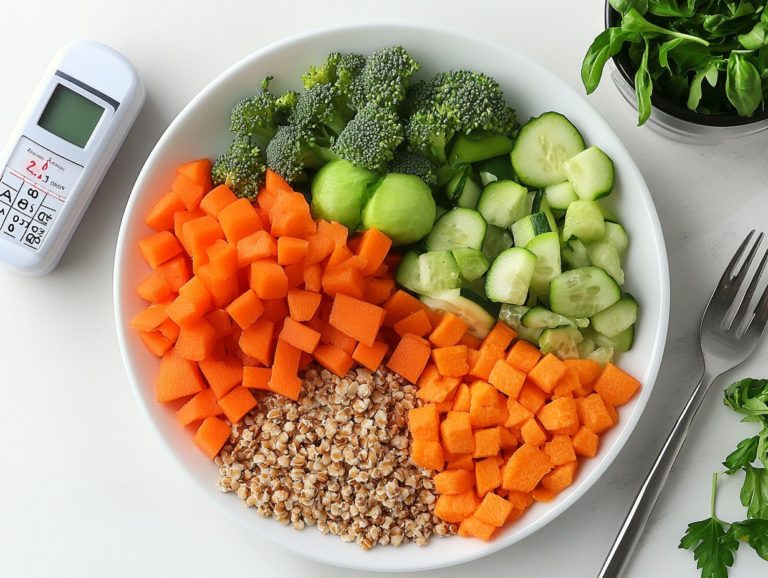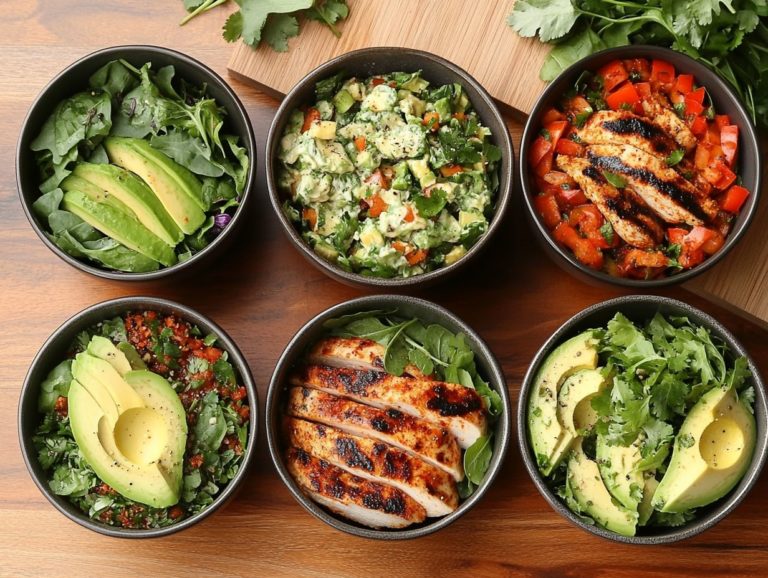10 Mediterranean Diet Staples for Health
The Mediterranean diet is not just delicious food; it serves as a robust pathway to healthier living.
Drawing from the traditional eating habits of countries surrounding the Mediterranean Sea, this diet emphasizes fresh, wholesome ingredients that nurture both body and mind.
In this article, you ll explore ten essential staples that form the backbone of the Mediterranean lifestyle, along with the health benefits they provide and some common misconceptions.
Whether you re aiming to elevate your diet or simply curious about this renowned eating pattern, get ready to uncover a wealth of knowledge!
Contents
- Key Takeaways:
- 1. Olive Oil
- 2. Fresh Fruits and Vegetables
- 3. Whole Grains
- 4. Fish and Seafood
- 5. Nuts and Seeds
- 6. Legumes
- 7. Herbs and Spices
- 8. Yogurt and Cheese
- 9. Red Wine (in Moderation)
- 10. Lean Proteins
- What Is the Mediterranean Diet and Why Is It Popular?
- What Are the Health Benefits of Following a Mediterranean Diet?
- What Are the Key Components of a Mediterranean Diet?
- How Can One Incorporate Mediterranean Staples into Their Diet?
- What Are Some Common Misconceptions About the Mediterranean Diet?
- Can the Mediterranean Diet Be Customized for Specific Dietary Needs?
- Frequently Asked Questions
- What are the 10 Mediterranean Diet Staples for Health?
- Why is the Mediterranean Diet considered healthy?
- What are some easy ways to incorporate Mediterranean Diet staples into my meals?
- Is it necessary to completely eliminate red meat from my diet to follow the Mediterranean Diet?
- Can I still eat sweets and desserts on the Mediterranean Diet?
- What are the potential health benefits of following the Mediterranean Diet?
Key Takeaways:
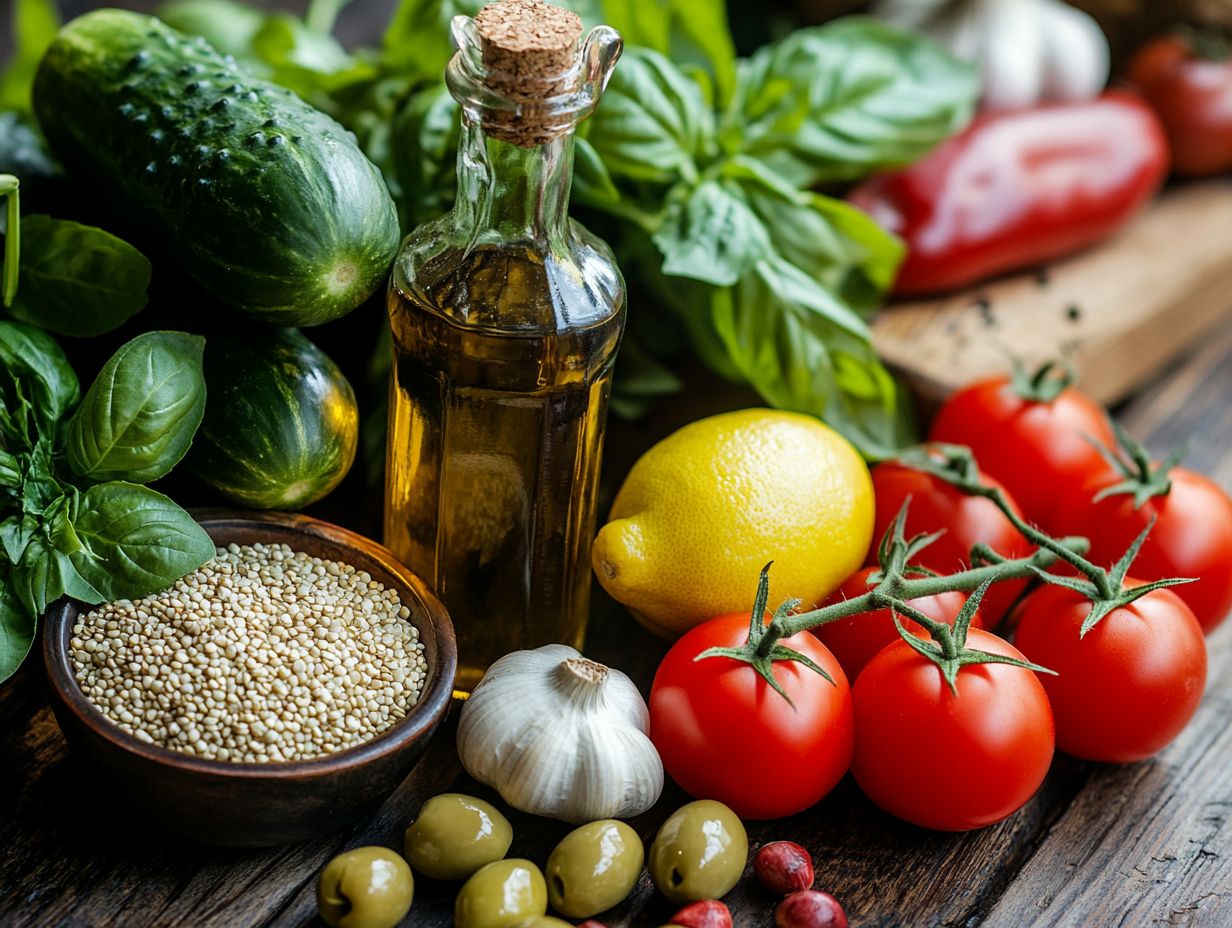
- Incorporating olive oil into your diet can reduce the risk of heart disease and improve overall health.
- The Mediterranean diet is rich in fresh fruits and vegetables, providing essential vitamins, minerals, and antioxidants.
- Whole grains, such as whole wheat bread and brown rice, are staples in the Mediterranean diet and can improve digestion and lower the risk of chronic diseases.
1. Olive Oil
Olive oil, particularly extra virgin olive oil, stands as a cornerstone of the Mediterranean diet, renowned for its rich flavor and a plethora of health benefits. Its high content of healthy fats that are good for your heart supports heart health and contributes to longevity.
This golden elixir is brimming with antioxidants and substances that reduce inflammation, making it a must-have for heart health today! Its unique blend of nutrients works to promote healthy cholesterol levels while safeguarding your blood vessels from damage.
In the kitchen, olive oil shines as a versatile ingredient, elevating everything from dressings and marinades to saut ed vegetables and roasted meats. When woven into a balanced meal plan especially one inspired by Mediterranean recipes it transforms simple dishes into delightful culinary experiences while providing a wealth of nutrients that bolster your overall health.
2. Fresh Fruits and Vegetables
Fresh fruits and vegetables are essential to the Mediterranean diet, offering an impressive array of antioxidants, vitamins, and minerals that elevate your overall health and well-being. Embrace nutrient-dense options like berries and leafy greens, as they can work wonders for your body.
Incorporating a diverse selection of these foods is crucial for maintaining gut health and regulating blood sugar levels. Enhance your meals with vivid colors and varied textures; for example, tossing chickpeas into a roasted vegetable medley transforms it into a satisfying, fiber-rich dish.
Infusing Mediterranean flavors such as olive oil, garlic, and fresh herbs not only elevates taste but also amplifies health benefits. Picture a simple salad drizzled with lemon and adorned with seasonal produce a delightful exploration through the vibrant spectrum of healthful eating awaits you.
3. Whole Grains
Whole grains are essential to the Mediterranean diet, offering the dietary fiber necessary for digestive health and helping to regulate blood sugar levels. Quinoa stands out as a popular, nutrient-dense choice among these grains.
In addition to quinoa, you ll find a variety of whole grains like barley, farro, and brown rice, each bringing its own unique flavors and textures to your culinary creations. Incorporating these grains into your daily meals elevates taste and boosts overall wellness, aiding in weight management and promoting heart health thanks to their rich nutrient profiles.
Consider a hearty barley salad tossed with fresh vegetables and a drizzle of olive oil this makes for a delightful side dish. Or indulge in a comforting farro risotto as a satisfying main course. By exploring these whole grains within Mediterranean cuisine, you can savor delicious meals that nourish both body and mind.
4. Fish and Seafood
Fish and seafood are stars of the Mediterranean diet, especially varieties packed with healthy fats found in fish like salmon. You ll appreciate their renowned cardiovascular benefits and anti-inflammatory properties.
Incorporating these oceanic treasures into your meals enhances flavor and boosts nutrients, providing a plethora of vitamins and minerals essential for your overall health. The high-quality protein found in seafood supports muscle maintenance and repair, making it a fantastic addition to your meal plan.
For a quick cooking tip, consider grilling or baking fish with a drizzle of olive oil and fresh herbs. This method preserves nutrients and enhances taste. Mediterranean-style recipes, like a zesty seafood paella or a classic fish stew brimming with vegetables, can transform mealtime into an exciting and nutritious experience, encouraging a sustainable approach to healthy eating.
5. Nuts and Seeds
Nuts and seeds are essential sources of healthy fats and plant-based protein in the Mediterranean diet, making them superb choices for snacks and meal components that promote heart health and overall wellness.
By incorporating these nutrient-dense foods into your diet, you can significantly enhance your intake of dietary fiber, which is crucial for digestive health. Their antioxidant properties work wonders in combating oxidative stress. Almonds, walnuts, chia seeds, and flaxseeds deserve mention for their rich omega-3 fatty acids, which are particularly beneficial for brain health.
To effortlessly weave these nutritious gems into your daily meals, consider adding them to yogurt, tossing them into salads, or mixing them into oatmeal. They also make excellent toppings for homemade granola. Embracing Mediterranean culinary traditions, like blending tahini (ground sesame seeds) into dressings or crafting nut-based pestos, elevates flavor while enhancing nutritional profile.
6. Legumes
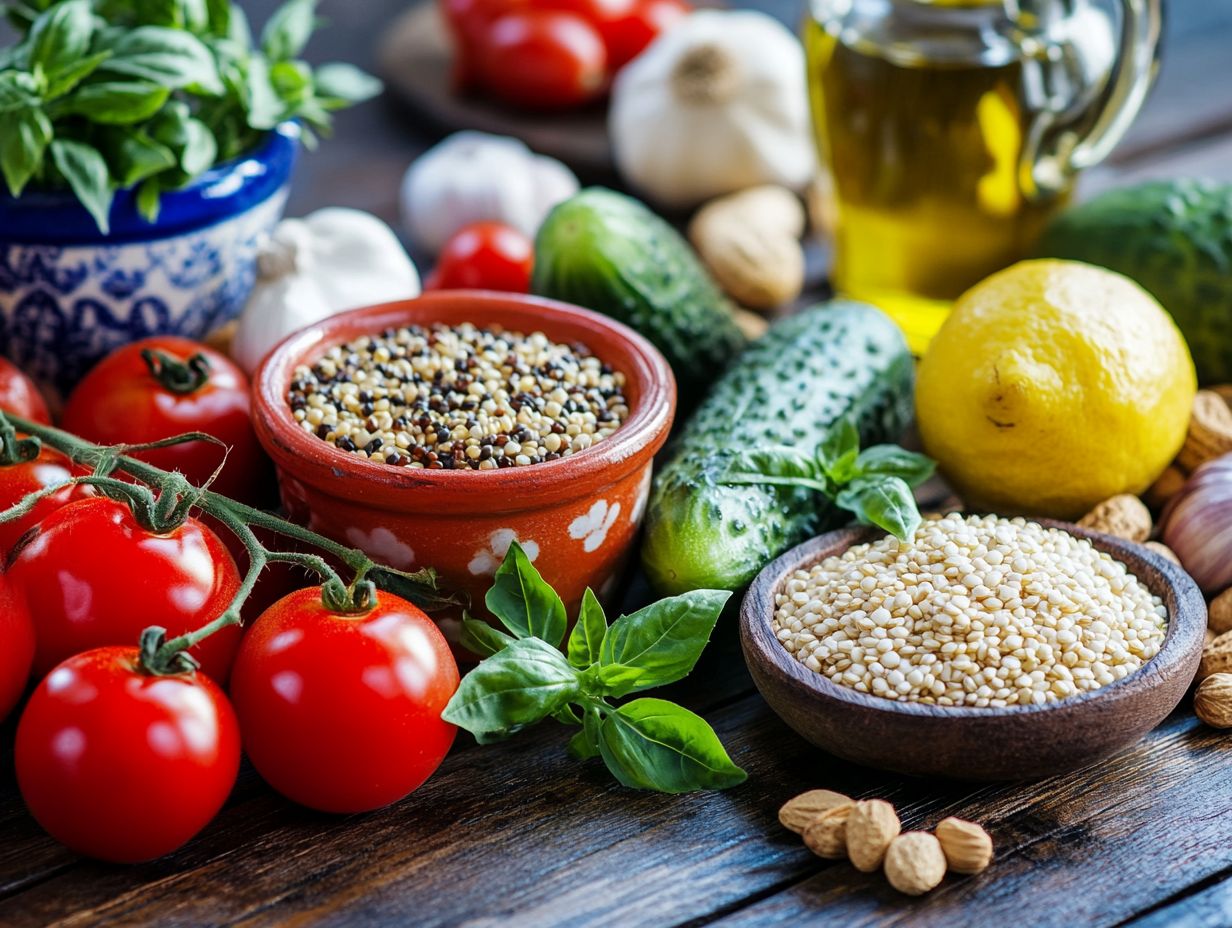
Legumes, such as chickpeas, play a pivotal role in the Mediterranean diet, offering high-quality plant-based protein and dietary fiber that support gut health and assist in weight management.
Beyond chickpeas, the legume family boasts stars like lentils, black beans, and white beans, each bringing unique nutritional profiles and benefits to the table. These small powerhouses are rich in protein and brimming with essential vitamins and minerals like iron and magnesium.
Incorporating legumes into your daily meals can be a delightful culinary experience. Enjoy a vibrant Mediterranean salad with lentils and fresh vegetables for lunch or savor a hearty bean stew that warms the heart and soul at dinner.
Traditional recipes like hummus, made from chickpeas, or a comforting lentil soup highlight the versatility of these ingredients, making them ideal companions for any Mediterranean-inspired feast.
7. Herbs and Spices
Herbs and spices are essential to Mediterranean cuisine, elevating flavors while delivering a host of health benefits, including antioxidants and anti-inflammatory properties that complement a healthy lifestyle.
When you reach for favorites like oregano, basil, and thyme, you re not just enhancing your dish; you re also tapping into potential digestive benefits that support heart health. Spices like cumin and paprika bring a warm, smoky depth that reduces the need for salt, cutting down on sodium intake without compromising taste.
Adding fresh herbs like parsley and rosemary further enriches your meals with vitamins and minerals that bolster overall wellness. Embracing these culinary treasures invites a vibrant gastronomic experience while maintaining a health-conscious approach.
8. Yogurt and Cheese
Greek yogurt and various cheeses are fundamental dairy products in the Mediterranean diet. They are known for their good bacteria for your gut that supports digestive health and enhances your meal options.
These delightful foods are packed with protein and calcium, making them superb choices for anyone eager to elevate their nutrition. Incorporate Greek yogurt into your breakfast as a creamy base for granola or fresh fruit what a delicious and satisfying way to start your day!
Cheeses like feta or mozzarella elevate your salads, pastas, or wraps, adding both flavor and essential nutrients. Mix yogurt with herbs for a refreshing dip or use it as a spread on whole-grain bread topped with olives and roasted vegetables an ideal, nutritious snack that tantalizes the taste buds.
9. Red Wine (in Moderation)
Red wine, enjoyed in moderation, is celebrated for its connection to the Mediterranean diet, thanks to its rich antioxidant profile and potential heart health benefits. This dining approach goes beyond nutrition; it fosters connections and enhances the overall enjoyment of meals.
Indulging in moderate red wine can positively impact your cardiovascular health, promoting better blood circulation and potentially lowering bad cholesterol levels. The polyphenols in red wine, especially resveratrol, are natural compounds that can improve health by reducing inflammation.
In Mediterranean culture, sharing a glass of red wine is more than just a toast; it s a cherished ritual that encourages laughter and conversation. This beautifully illustrates how dietary habits can influence both physical health and social happiness.
10. Lean Proteins
Incorporating lean proteins like salmon into your diet is essential for maintaining a healthy lifestyle while following the Mediterranean diet. These proteins provide vital nutrients and support muscle health.
Salmon, along with options like grilled chicken, turkey, and legumes such as lentils and chickpeas, are excellent sources of lean proteins. They are low in saturated fats and packed with vitamins and minerals, promoting overall wellness. The Mediterranean diet balances these proteins with healthy fats, particularly olive oil, ensuring meals are nutritious and bursting with flavor.
To weave these lean proteins into your meal planning, consider preparing:
- Mediterranean-styled salads
- Hearty soups
- Wraps
These dishes can easily fit into your lunch or dinner routines, enriching your diet while keeping things straightforward and delicious.
What Is the Mediterranean Diet and Why Is It Popular?
The Mediterranean diet isn’t just a meal plan; it’s a lifestyle steeped in the rich culinary traditions of countries by the Mediterranean Sea. It emphasizes whole foods, healthy fats, and plant-based options, celebrating the joy of eating.
This diet features a delightful array of fruits, vegetables, whole grains, nuts, and legumes, complemented by fish and olive oil as primary sources of fat. Traditional staples like yogurt and cheeses add a cultural flair, honoring a deep heritage. Cooking methods often include grilling, roasting, or saut ing, enhancing vibrant flavors without excessive added fats.
The diet’s growing popularity can be traced to its impressive health benefits, including improved heart health, effective weight management, and the promise of increased longevity. It’s a holistic approach that invites you to eat well and embrace a balanced lifestyle.
Start your journey to better health today with the Mediterranean diet!
What Are the Health Benefits of Following a Mediterranean Diet?
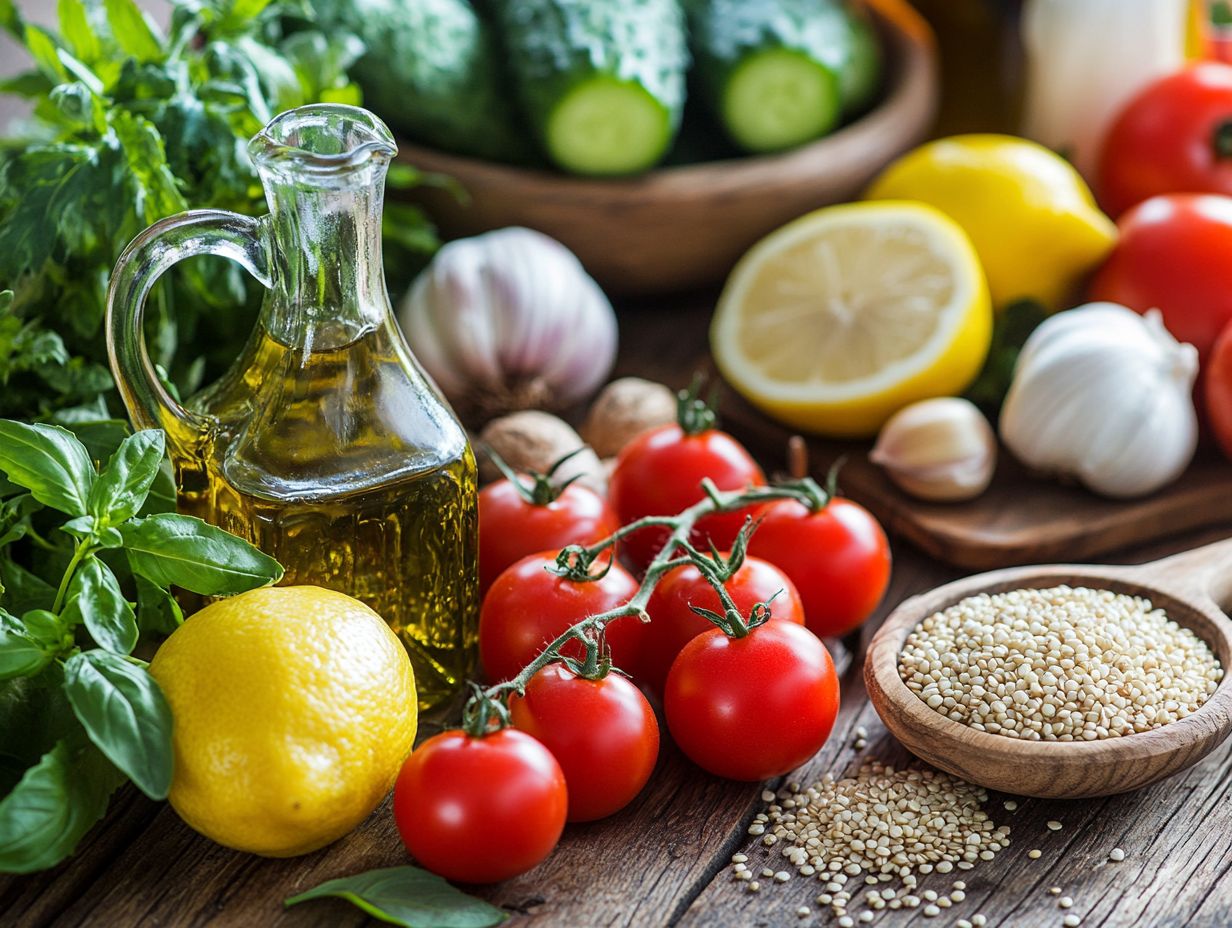
Embracing a Mediterranean diet opens the door to numerous health benefits. You can enjoy a lower risk of cardiovascular disease, enhanced longevity, and an overall boost in wellness through a balanced and nutritious food selection.
Research shows that this diet, rich in fruits, vegetables, and healthy fats like olive oil, can lower cholesterol levels and blood pressure. A significant study from the New England Journal of Medicine found that individuals following this diet had a remarkable 30% reduction in the risk of cardiovascular events over several years.
The diet focuses on substances that help fight damage in your body and omega-3 fatty acids. These components are linked to reduced inflammation and improved metabolic health, making it a great strategy for maintaining heart health and promoting overall well-being.
What Are the Key Components of a Mediterranean Diet?
The Mediterranean diet revolves around essential components that boost your health. You ll find whole foods, healthy fats like extra virgin olive oil, whole grains, lean proteins, and a colorful variety of fresh fruits and vegetables each contributing to its remarkable benefits.
These ingredients provide essential nutrients and work together to promote your overall well-being. For instance, eating fatty fish like salmon and sardines offers heart-healthy omega-3 fatty acids. Legumes, such as lentils and chickpeas, are fantastic sources of plant-based protein and fiber.
Whole grains, including quinoa and farro, provide sustained energy and are rich in B vitamins. Add vibrant vegetables like tomatoes, spinach, and bell peppers to your meals for a boost of antioxidants that help fight inflammation.
All together, these ingredients create flavorful dishes that nourish both your body and mind, making it easier to adopt a healthy lifestyle.
How Can One Incorporate Mediterranean Staples into Their Diet?
Incorporating Mediterranean staples into your diet is easy with some meal planning. Focus on healthy snacks and cooking tips that highlight whole foods and the rich flavors of traditional Mediterranean cuisine.
By trying simple recipes with ingredients like chickpeas, quinoa, and olive oil, you can elevate your meals with vibrant tastes and essential nutrients. A refreshing chickpea salad with tomatoes, cucumbers, and a zesty lemon-olive oil dressing is an excellent lunch option.
Consider swapping refined grains for farro or brown rice in stir-fries and casseroles. For easy snacking, mix nuts and dried fruits, or enjoy whole-grain pita with hummus. These small but meaningful changes will effortlessly integrate Mediterranean cuisine into your daily life.
What Are Some Common Misconceptions About the Mediterranean Diet?
There are many misconceptions about the Mediterranean diet. Some believe it s strictly a low-carb approach, but it actually emphasizes a wide variety of whole foods while minimizing processed items and refined grains.
You might think this dietary lifestyle is overly restrictive, but it offers remarkable flexibility, accommodating various preferences and restrictions. For example, if you re a vegetarian or vegan, you can easily adapt the Mediterranean diet by focusing on plant-based proteins, legumes, and nuts.
If gluten sensitivity is a concern, you can choose gluten-free grains like quinoa or rice while still savoring the vibrant flavors of fresh fruits, vegetables, and healthy fats.
This versatility invites everyone to enjoy the benefits of this diet, promoting a sustainable and enjoyable way of eating tailored to fit your unique lifestyle. Start incorporating these delicious staples today for a healthier tomorrow!
Can the Mediterranean Diet Be Customized for Specific Dietary Needs?
The Mediterranean diet is remarkably versatile, allowing you to tailor it to your specific dietary needs while still embracing a healthy lifestyle rooted in its core principles.
If you re living gluten-free, consider replacing regular pasta with spiralized vegetables or gluten-free grains like quinoa. These alternatives are not only satisfying but also bursting with flavor.
For those who are vegetarians, hearty options abound think lentil soups or chickpea salads. These dishes ensure you re getting plenty of protein and nutrients without sacrificing taste.
If you re on a low-carb diet, cauliflower rice or zoodles can replace grain-based dishes, crafting a meal that s both delicious and filling. These adaptations let you enjoy the vibrant flavors of the Mediterranean while meeting your unique dietary requirements in a truly enjoyable way.
Frequently Asked Questions
What are the 10 Mediterranean Diet Staples for Health?
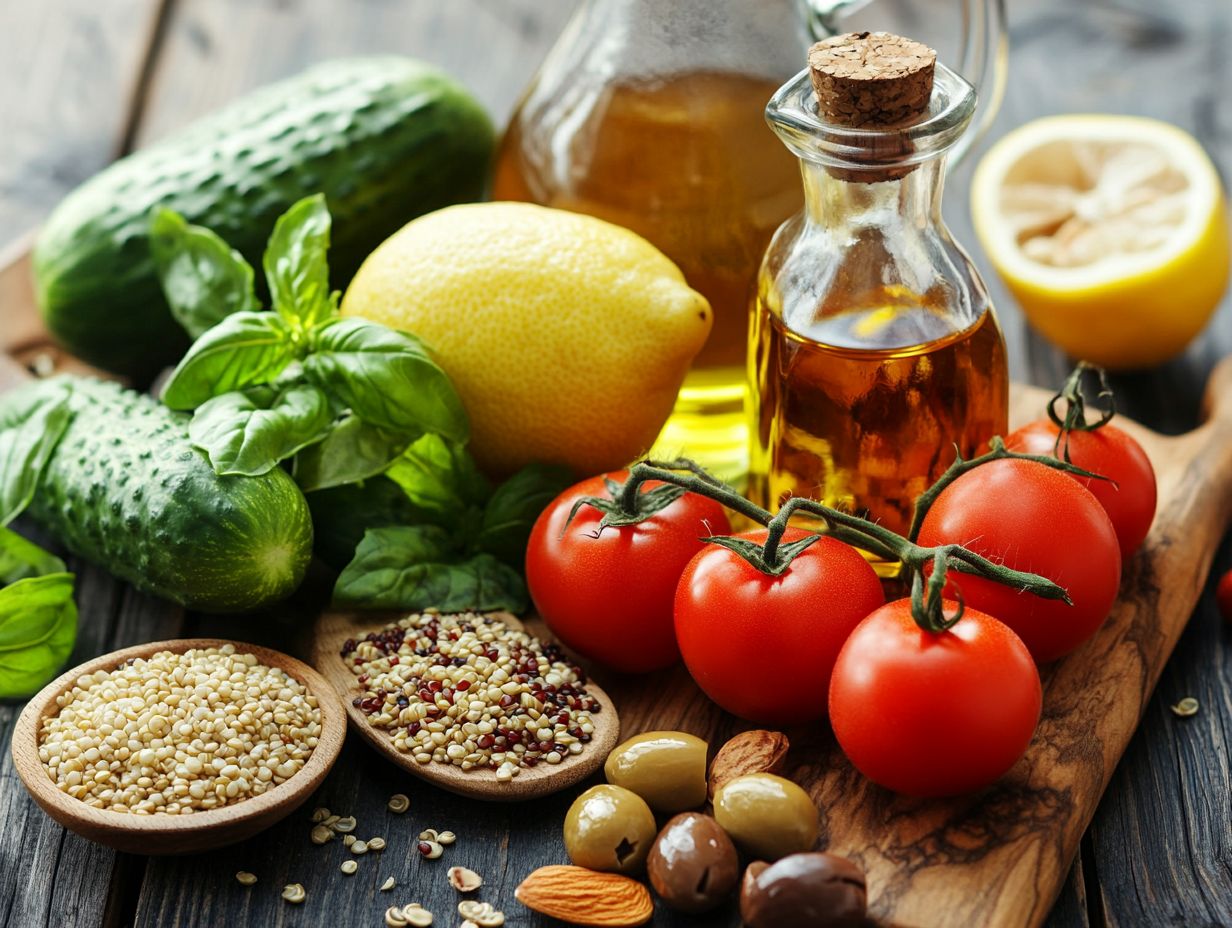
The 10 Mediterranean Diet Staples for Health include olive oil, whole grains, legumes, fish, fruits, vegetables, nuts, herbs and spices, red wine, and dairy products in moderation, along with 10 must-try Mediterranean recipes for health to enhance your meal planning.
Why is the Mediterranean Diet considered healthy?
The Mediterranean Diet is healthy because it focuses on whole, unprocessed foods that are rich in nutrients and beneficial for overall health. It also promotes moderate consumption of red wine, linked to heart health.
What are some easy ways to incorporate Mediterranean Diet staples into my meals?
Some easy ways to add Mediterranean Diet staples to your meals include using olive oil as your main cooking oil, adding nuts and seeds to salads and yogurt, and using herbs and spices to flavor dishes instead of salt.
Is it necessary to completely eliminate red meat from my diet to follow the Mediterranean Diet?
No, you don’t have to completely eliminate red meat from your diet to follow the Mediterranean Diet. However, it does recommend limiting red meat consumption to a few times a month and opting for leaner cuts.
Can I still eat sweets and desserts on the Mediterranean Diet?
Feel free to indulge in sweets and desserts on the Mediterranean Diet, but do so in moderation. The diet suggests limiting added sugars and choosing whole foods like fresh fruits for a naturally sweet treat.
What are the potential health benefits of following the Mediterranean Diet?
The potential health benefits of following the Mediterranean Diet include reducing the risk of heart disease, improving brain function, promoting weight loss, and increasing longevity.
Ready to embrace the Mediterranean lifestyle? Start your journey today!

